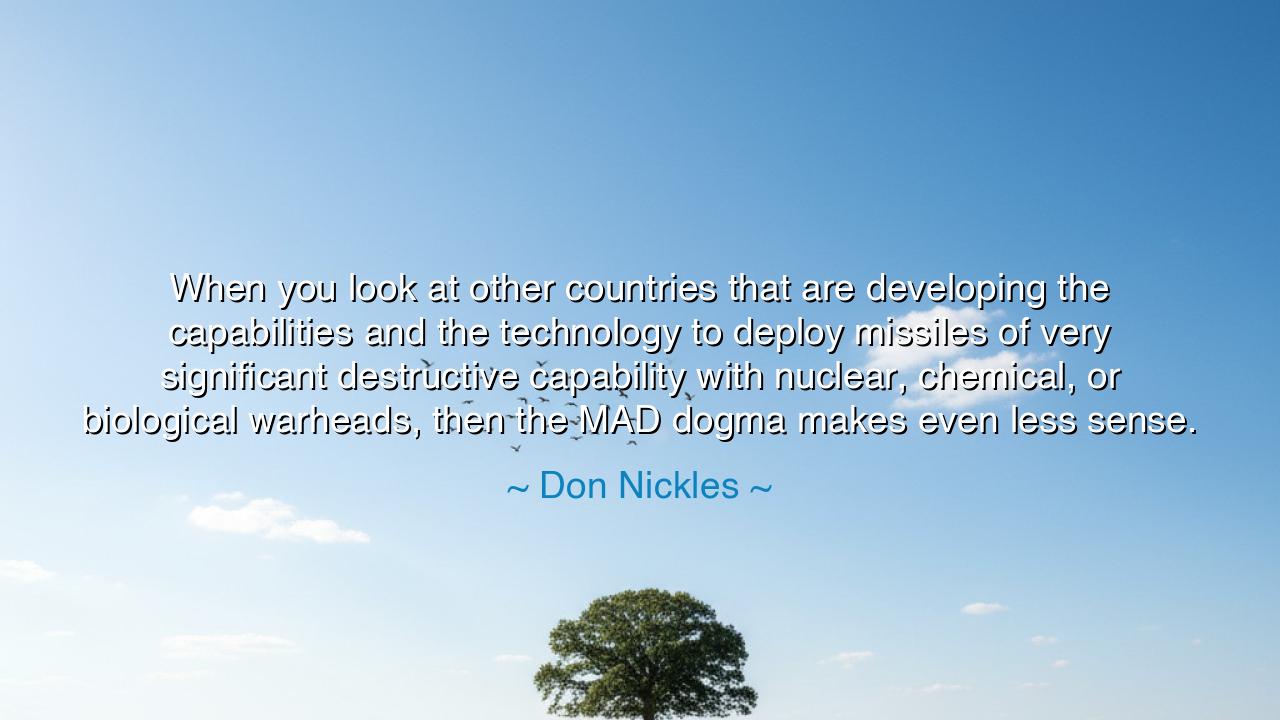
When you look at other countries that are developing the
When you look at other countries that are developing the capabilities and the technology to deploy missiles of very significant destructive capability with nuclear, chemical, or biological warheads, then the MAD dogma makes even less sense.






Hear the words of Don Nickles, who spoke with the weight of grave concern: “When you look at other countries that are developing the capabilities and the technology to deploy missiles of very significant destructive capability with nuclear, chemical, or biological warheads, then the MAD dogma makes even less sense.” These are not the idle musings of a statesman, but the echo of an ancient dilemma—the struggle between fear and reason, between power and survival. In his voice we hear the tremor of ages, for mankind has long wrestled with the paradox of destruction as a means of peace.
The heart of his saying rests upon the doctrine of MAD—Mutually Assured Destruction. In the days of the Cold War, this dogma ruled the thoughts of leaders: that if one nation unleashed its nuclear fire, the other would respond with equal fury, and thus both would be annihilated. By this strange, terrible balance, peace was kept. It was as if two warriors stood, each with swords at the other’s throat, neither daring to move. For decades this fragile terror held back apocalypse.
Yet Nickles looks beyond that age and warns us of the new world. For in the time of his speaking, it was no longer only the great empires that held such weapons. He points to other countries—nations smaller, yet burning with ambition, gathering capabilities and technology to fashion missiles bearing death on a scale once reserved for giants. With nuclear, chemical, or biological warheads, their hands too reached for the power to destroy cities and nations. In such a world, the logic of MAD falters. For when many grasp the sword, who can believe they will all hold it steady forever?
History gives us clear warning. Recall the Peloponnesian War, when Athens and Sparta once held each other in balance. At first, deterrence restrained them, for neither wished to suffer the other’s wrath. Yet when smaller allies, restless and ambitious, drew them into conflict, the balance collapsed, and Greece was consumed in ruin. So too may it be in our own age: great powers may remain cautious, but when new actors rise with weapons of terror, the doctrine of balance shatters like fragile glass.
Nickles’ words are not despair alone; they are a call to wisdom. He tells us that clinging blindly to the dogma of the past will not save us in the future. The world changes, and so too must our approach to peace. To imagine that the fears of the Cold War alone can guide us in the age of proliferation is to walk with closed eyes toward the abyss. For when weapons spread to many hands, deterrence weakens, and vigilance, diplomacy, and foresight become our true shields.
Thus the lesson is clear: do not trust in doctrines alone, but in the living wisdom of adaptation. For every age demands new strategies, just as every warrior must learn new skills when the battlefield changes. The weapons of technology may evolve, but the call of conscience remains the same: to guard life, to restrain power, and to seek peace even amid preparation for war. Let not fear drive us to folly, nor pride blind us to danger.
Practical action lies before all: demand from leaders foresight, not complacency. Support efforts to limit the spread of weapons that no nation should wield. Seek knowledge of history, so that its warnings may sharpen your judgment. And in your own life, remember this truth: old solutions may not fit new challenges. As the world changes, so must your wisdom. Only then can we hope that Nickles’ warning will remain a teaching, and not a prophecy fulfilled.






AAdministratorAdministrator
Welcome, honored guests. Please leave a comment, we will respond soon